Note
how do i write when i have adhd and cant even outline the first three chapters:( i always get stuck after three, get bored, and never come back. any advice ?
Writing with ADHD (by a writer w/ adhd)
1. Consume caffeine and/or do cardio for 30min before sitting down to write. Listen to music, a themed playlist perhaps. Do not log onto the internet or have any distractions nearby (books, pets, clutter, food, unfinished projects). Keeping a dohickey like a stress ball around or even a lightweight dumbbell is a decent proxy when your brain craves distraction. Chewing gum can also help you focus.
2. Don’t outline by chapter, I cannot get farther than five or six when I do that. Outline from beginning to end, but make sure to have a middle! Write a synopsis of what happens and break it into chronological chunks. Only outline by chapter once you’ve got a general outline of the whole story, and even then only outline a couple chapters at a time.
3. Write whatever comes to you, but keep it in order in your document. You want to write how your character discovers a secret, but you know that’s not until chapter 20. Write it anyway and title it chapter 20. Do this with every scene you’re inspired to write, then slowly fill in the gaps. If that proves difficult, it’s okay to make the reveal chapter 9 instead and connect everything with [and then this happened] so you’ll know to sew it up later.
4. However short or long the story ends up being, finish it. You can set a goal of 30 chapters, but if 10 is easier finish by chapter ten. Come back (much) later, reread, and add any new ideas you come up with. A short story is sweet! A novella is nice! Train your brain to write longer passages until it can achieve a story of the length you want.
5. (optional) Outlining is for people who can focus, just start writing somewhere and figure it out along the way. I had a very general outline for my longest novel, but mostly I made everything up and ignored it. Maintain focus, know your end goal, and even if you stumble there and take some shortcuts it still counts. Any messiness can be improved in future drafts.
+ Please review my Ask Policy before sending in your ask. Thank you!
+ If you benefit from my updates and replies, please consider sending a little thank you and Buy Me A Coffee!
+ HEY, Writers! other social media: Pinterest - Wattpad - AO3 - Goodreads
10K notes
·
View notes
Text
Study Masterpost
I spent a whole lot of time on this… tumblr post length limits KILL me when I make masterposts ૮₍ ˃ ⤙ ˂ ₎ა! I will update this with more resources, subjects etc until i run out of room. Make sure you check the tag “makabees masterposts” to find the updates. Feel free to send requests to my inbox for subjects ( ⸝⸝´꒳`⸝⸝)! Most of these are free resources..
MATHEMATICS
✧*̥˚ algebra*̥˚✧
khan academy’s free algebra course 1 / 2
OGT algebra playlist
Cliffnote’s algebra notes
Mathplanet for free textbook and videos
edx’s entire selection of algebra courses for free
brilliant’s algebra practice
thriftbooks algebra for dummies
✧*̥˚ calculus*̥˚✧
OGT calculus playlist
Khan academy precalculus course
Brilliant’s calculus course
Professor leonard calculus lectures
Caclulus MITOCW textbook (workbook?)
Calculus full course vid
✧*̥˚ physics*̥˚✧
pocket physics app (ANDROID ONLY)
intro to physics pdf
college physics openstax textbook
stanford: understanding einstein special theory of relativity course
SCIENCE
✧*̥˚ psychology*̥˚✧
sparknotes psychology
psychology 150 notes
simplypsychology guides for students
psychology crash course
coursera psychology selection
alison psychology selection
principles of neuropsychology pdf
MIT intro to psychology textbook
YALE intro to psychology lectures
✧*̥˚ biology*̥˚✧
khan academy bio courses HS / AP
STANFORD human behavioral bio lectures
MIT introduction to biology lectures
Biology sparknoets study guide
Thebiologynotes online bio notes for students
bio lectures
introduction to marine life course vid
marine biology at home playlist
marine biology lectures
marine biology lecture notes
✧*̥˚ chemistry*̥˚✧
general chemistry playlist
cliffnotes chemistry
khan academy chemistry
organic chemistry playlist
chemistry textbook pdf
✧*̥˚ neurology*̥˚✧ (brain stuff)
MIT open courseware cellular neurobiology
MIT ENTIRE NEUROSCIENCE OCW COLLECTION
neurology: divisions of the nervous system
neurology videos/playlist
HARVARD opencourseware neuroscience pt 1 / pt 2
✧*̥˚ astronomy*̥˚✧
astrobiology : exploring other worlds course
crash course astronomy playlist
YALE astronomy lectures
CALTECH astronomy lectures
general astronomy lectures
caltech the evolving universe course
journey throught he universe documentary
✧*̥˚ cosmology*̥˚✧
STANFORD cosmology lecture collection
understanding modern physics: cosmology and relativity
the beginning and end of the universe documentary
caltech physical foundations of cosmology pdf
intro to cosmology pdf
✧*̥˚ ecology/environmental*̥˚✧
MIT open courseware Ecology 1: The earth system
MIT open courseware Ecology 2: engineering for sustainability
MIT open courseware oceanography
Elements of ecology thriftbooks
netflix our planet playlist
✧*̥˚ geology*̥˚✧
engineering geology and geotechnics
geology 101 lectures uni of hawaii
MIT OCW intro to geology notes
geological sciences lectures
✧*̥˚ archaeology*̥˚✧
osteoarchaeology: the truth in our bones course
the archaeology of disease documented in skeletons
introduction to archaeology lecture
archaeology lectures playlist
ENGLISH/LITERATURE/ARTS
✧*̥˚ grammar*̥˚✧
grammarly handbook
purdue writing lab
✧*̥˚ literature*̥˚✧
Thriftbooks entire literature section for cheap lit
creative writing specialization
plagues witches and war: the worlds of historical fiction
✧*̥˚arts*̥˚✧
MIT open courseware Intro to art history
lecture at MFA
prehistoric art lecture
my art ref masterpost
list of pdf books that might help artists
✧*̥˚mythology*̥˚✧
greek and roman mythology pdf
greek and roman mythology course
old norse mythology in the sources course
2K notes
·
View notes
Text
☆HOW TO PROPERLY PREPARE 4 AN EXAM☆
Studying for exams is something essential in students lives. We all spend most of our time preparing for those sheets of paper that we are so afraid of and, sometimes, we do it in the wrong way without even noticing it.
Some of us use study-to-pass methods, which aren't effective because you will end up forgetting everything that you studied!!
That's why we all should learn how to study in a way that we don't only pass the exam, but also remember everything (or most part of it).
So, here, I'm going to show you not only how to properly prepare for an exam, but also how to keep those things that you studied in your long-term memory, so you don't forget them!!
A little disclaimer: this is how I prepare for exams, but that doesn't mean that you have to prepare for exams like this too, and that's ok <333 Everyone is different, so our study and organization methods are. Just try this method and, if it doesn't work, you can try another one or even make your own!!
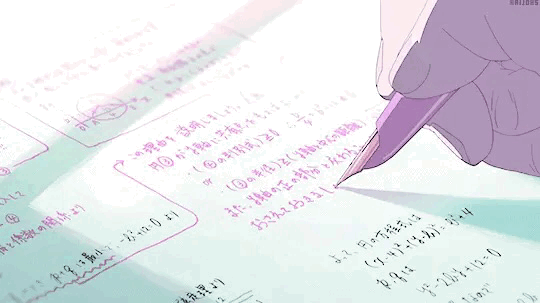
For being able to prepare properly, you will have to start studying from four to two weeks before the exam, it depends on how difficult you find the subject and how easy it is for you to study.
The steps to prepare for an exam are:
1.- Plan your study sessions
Planning our study sessions ahead is very important if we want to stay organized. But, how do we do that??
First, write a list of all the things that you will have to study for the exam.
In a calendar (it can be weekly or monthly) write which day you are going to study each of the things that are on the list.
Leave two or three days before the exam for revision, which means that you won't study, only review what you have already studied.
2.- Eliminate distractions
Before we start studying for an exam, we have to declutter our workspace. Put away the things that may distract you and leave only the stuff that you will need for your study sessions, such as your stationery, your laptop, etc.
Once you have ended with physical distractions, it's time to end with the virtual ones. Set time limits on your phone or delete some apps, and install website blockers on your computer.
Since we won't have anything that distracts us, it will be easier for us to stay focused.
3.- Start studying!!
Once you have done those steps, it's time to sit down, open your books and start studying.
Make sure that you follow your study plan correctly and that you don't procrastinate.
Each time that you finish studying and understanding very well a certain topic, cross it out on the list, so you know that you won’t have to put a lot of effort into it when you review it.
And when there's a topic that it's more difficult for you, mark it with a circle or something like that, so you know that you will have to review it more.
~♡ ~♡ ~♡ ~♡ ~♡ ~♡ ~♡ ~♡ ~♡ ~♡ ~♡ ~♡~
Now, you just need to know how to properly study and review.
• Active studying vs passive studying
Usually, students that study actively tend to have better results than students that don’t.
By studying actively, you don’t only make sure that you understand a certain topic, but you also retain that information in your brain for more time, or in other words, in your long term memory.
So, you have to avoid passive study methods, such as only reading your notes, textbooks, etc.
You have to avoid the easy and effortless methods because they’re not the more effective.
Some active study methods are:
The 60 seconds review
After every class, take 1 min to write the two or three main ideas by memory.
Rewrite your notes
Write them in your own words, using keywords and simple definitions that are easy to memorise.
Test yourself
Before studying something, write some questions about the most important things and, after studying, answer them
Don’t memorise, learn
Try to explain a topic in your own words to make sure that you understand it. Once you do so, study it (if you do it in your own words too it’s better).
You can find more active study methods on YouTube by searching “Active recall”, but these ones are the ones that I use!!
All these methods force your brain to think about what you have studied or what you are about to start studying. This helps to keep that information in your long term memory.
• Review
As I said before, you have to leave some days before your exam to review all that you have studied.
By reviewing all the information, your brain remembers it and slowly starts to keep it in your long term memory (because reviewing is an active study method too!!).
The steps for reviewing in a proper way are pretty easy:
1.- Take a paper
Divide a paper into 5 sections:
Title of the topic
General information
Keywords and their definitions
Things you forgot
Corrections
2.- Write
Put away your notes and books and complete each section by memory except the ones of things you forgot and corrections.
3.- What went wrong?
Take your textbooks and notes and compare what you wrote with what it’s written.
Write the corrections in the “correction” section
Write the things you forgot in the “things you forgot” section
4.- Review
Just review what you didn’t remember or what you were wrong at.
5.- Repeat
Do the whole process again until you get it all correct.
~♡ ~♡ ~♡ ~♡ ~♡ ~♡ ~♡ ~♡ ~♡ ~♡ ~♡ ~♡~
While you are studying for an exam, you have to consider some things that don’t have anything to do with studying, but that will help you to prepare properly and to succeed:
• Take breaks
Studying is very important, but resting is too.
When we study a lot of time, we end up feeling exhausted and overwhelmed, that's why we have to take breaks during our study sessions. They shouldn't be only breaks of ten minutes but of half an hour or so. Remember to don't use your phone or any technology on the breaks, because if you do so, you won't relax at all. Do a chill activity, such as reading, writing, drawing, painting, etc.
Also, by resting for a long period of time, your brain will be able to retain the stuff that you studied before more easily.
• Sleep enough time
We need to sleep because it gives us the energy that we need for the day.
You should sleep from 8 to 10 hours per day if you want to be fully rested, so stop sleeping just because you have to study isn't a good idea.
• Have water and snacks near you
Staying hydrated and eating is something VERY important for everyone.
It's normal to feel thirsty or hungry while you are studying, that's why I recommend having a water bottle and some healthy snacks always on your workspace to avoid standing up, going to the kitchen and, as a consequence, stop being focused on what you were doing.

(omg this is so long- I’m sorry lol)
I hope that you find this guide helpful!!!
Act like the person you want to become~
Take care!! ♡
914 notes
·
View notes
Text


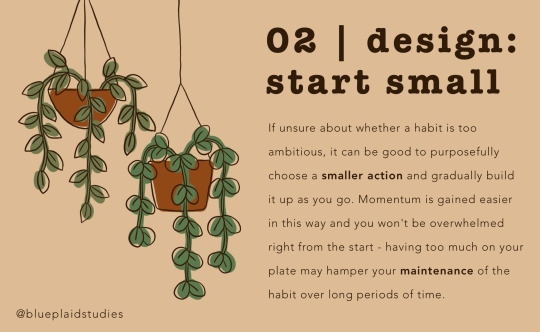
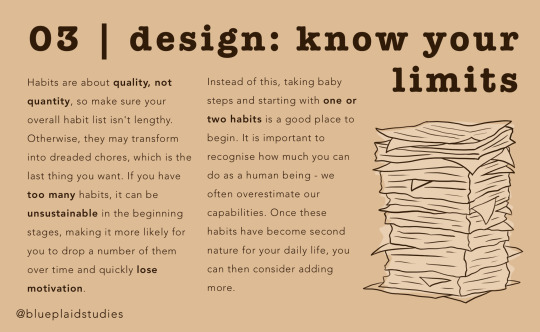
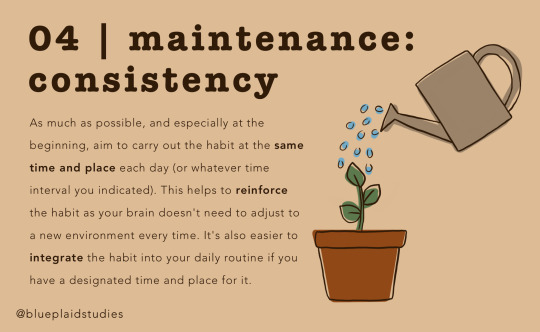
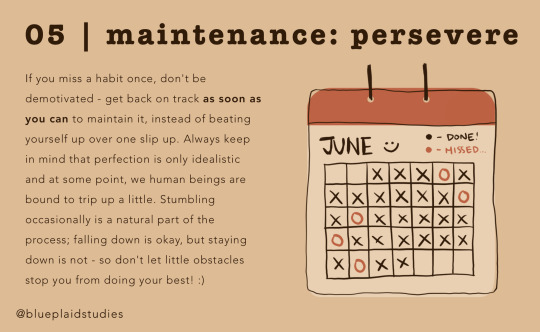
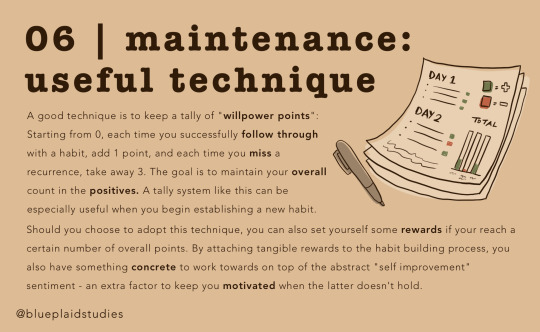
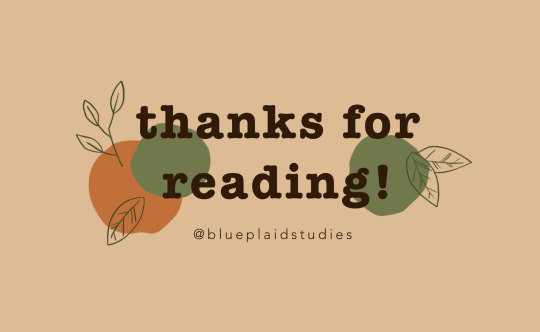
How to form habits that last
Click for better quality and zoom in.
Greetings! 💚 Here’s a little something I’ve been working on, which I hope you’ll find useful. :)
All text and graphics are created by me, Sal @blueplaidstudies.
☞ studygram
8K notes
·
View notes
Photo

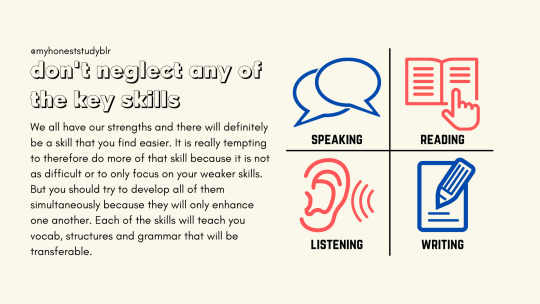
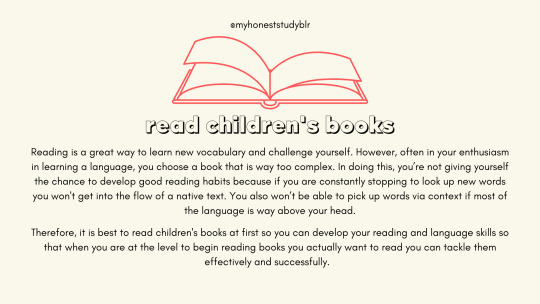


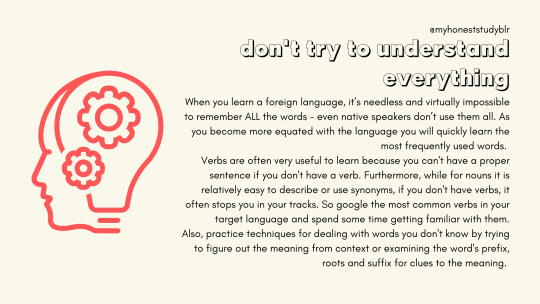
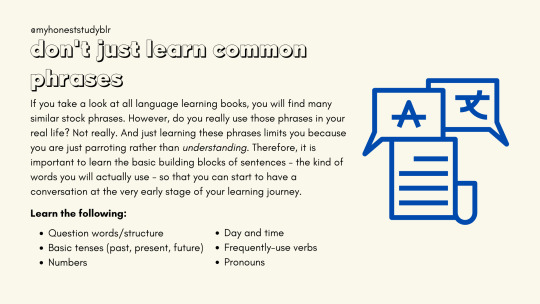
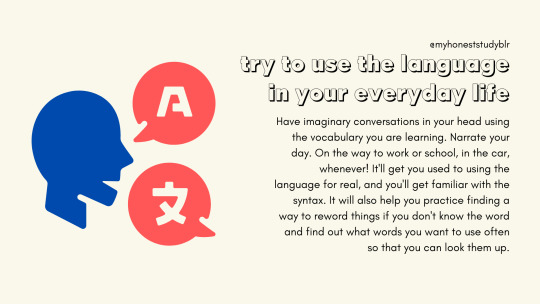


my masterpost | my studygram | ask me anything
[click images for high quality]
[transcript under the cut]
Other advice posts that may be of interest:
How To Study When You Really Don’t Want To
How To Do Uni Readings
Active Revision Tips
Keep reading
8K notes
·
View notes
Photo
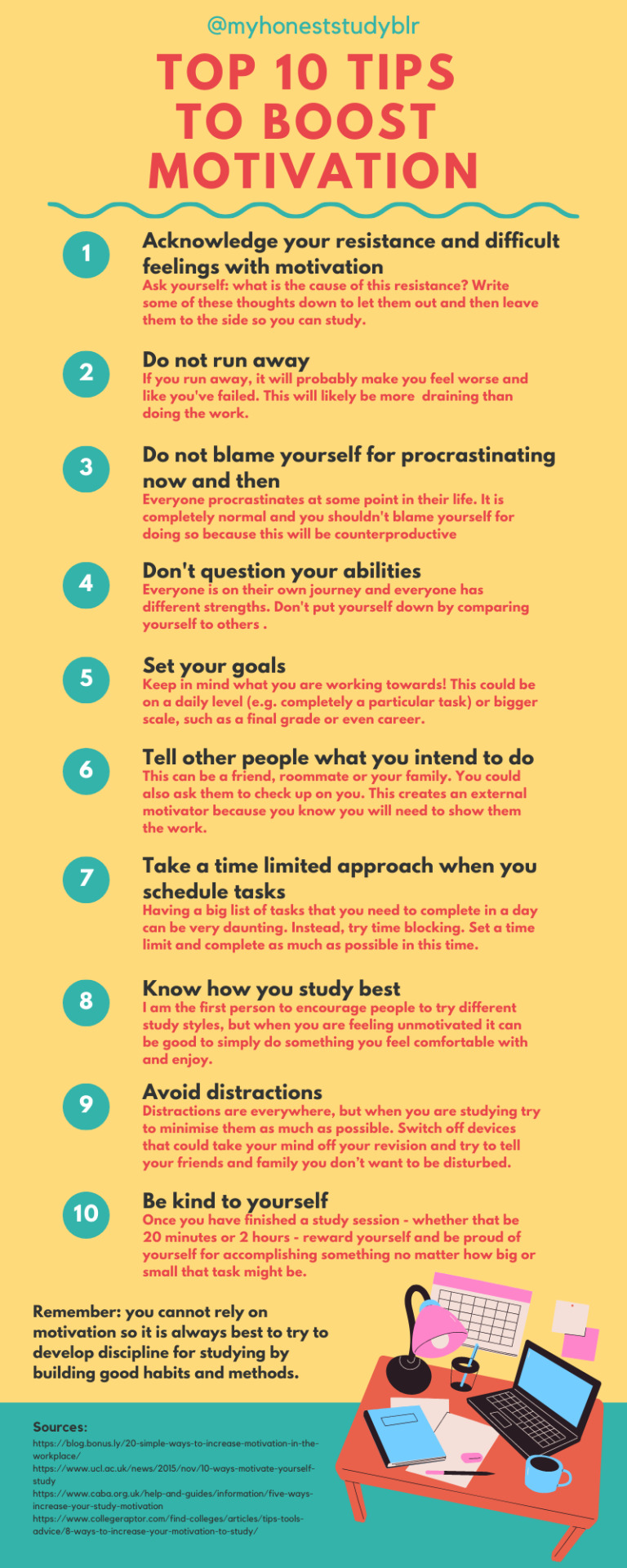
my masterpost | my studygram | ask me anything
[click images for high quality]
Other advice posts that may be of interest:
How To Stop Procrastinating
How To Study When You Really Don’t Want To
Unusual Study Tips
How To Do Uni Readings
Active Revision Tips
How to Focus in Online Classes
1K notes
·
View notes
Text
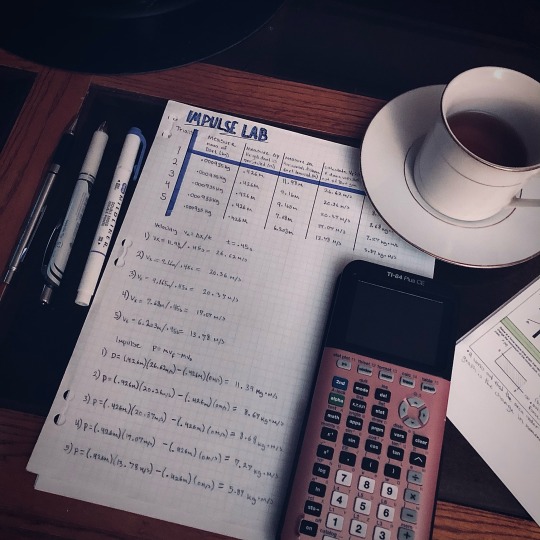
February 28, 2021 // second semester
3/100 Days of Productivity
Would you look at that, left off on the 22, and now it's the 28... must have been the work of the ✨Dark Reunion✨. Haha, no, I just got sad, played Minecraft, and ate a packet of chocolate chips, as one does. However, that only lasted two days. The rest was me being too tired and passing out before I could scribble something out.
I did manage to accomplish a few things I've been putting off, like making a dentist appointment like a functioning new young adult and reaching out to my school and college counselor. I also got offered a part-time job after my internship has ended. So life is starting to clear up some and make a small path to follow. I completed a little lab for my physics class, even got to add a little color. I can confidently conclude this day as a positively productive one. :)
0 notes
Text
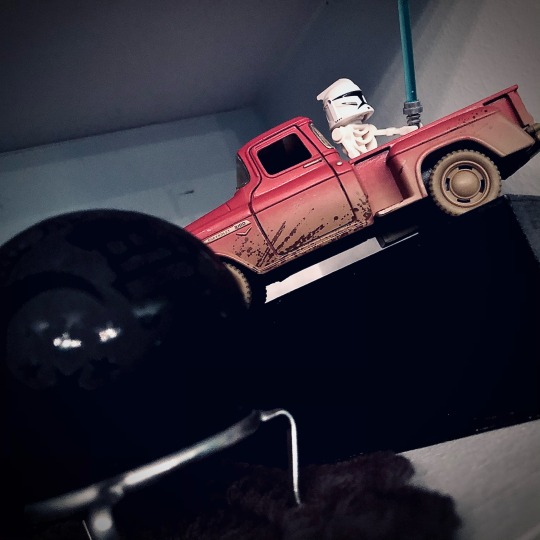
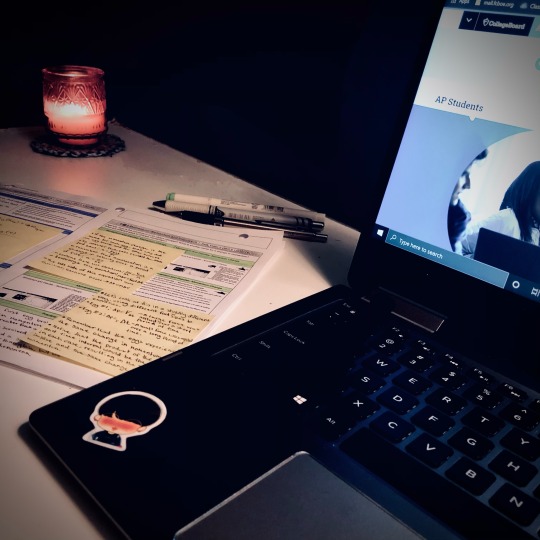
February 23, 2021 // second semester
2/100 Days of Productivity
Started today by giving my soul...I-I mean completing a quiz on College Board for ap Lit. Then I did my ap physic homework, a bit longer than it usually takes, but I guess that tends to happen when you have a toddler rambling about legos and every little detail about your room as a distraction. I got started on the FRQ's I'm missing for my apcs class since I'm a little behind.
0 notes
Text
Essays
Here’s a (non-exhaustive) list of essays I like/find interesting/are food for thought; I’ve tried to sort them as much as possible. The starred (*) ones are those I especially love
also quick note: some of these links, especially the ones that are from books/anthologies redirect you to libgen or scihub, and if that doesn’t work for you, do message me; I’d be happy to send them across!
Literature + Writing
Godot Comes to Sarajevo - Susan Sontag
The Strangeness of Grief - V. S. Naipaul*
Memories of V. S. Naipaul - Paul Theroux*
A Rainy Day with Ruskin Bond - Mayank Austen Soofi
How Albert Camus Faced History - Adam Gopnik
Listen, Bro - Jo Livingstone
Rachel Cusk Gut-Renovates the Novel - Judith Thurman
Lost in Translation: What the First Line of “The Stranger” Should Be - Ryan Bloom
The Duke in His Domain - Truman Capote*
The Cult of Donna Tartt: Themes and Strategies in The Secret History - Ana Rita Catalão Guedes
Never Do That to a Book - Anne Fadiman*
Affecting Anger: Ideologies of Community Mobilisation in Early Hindi Novel - Rohan Chauhan*
Why I Write - George Orwell*
Rimbaud and Patti Smith: Style as Social Deviance - Carrie Jaurès Noland*
Art + Photography (+ Aesthetics)
Looking at War - Susan Sontag*
Love, sex, art, and death - Nan Goldin, David Wojnarowicz
Lyons, Szarkowski, and the Perception of Photography - Anne Wilkes Tucker
The Feminist Critique of Art History - Thalia Gouma-Peterson, Patricia Mathews
In Plato’s Cave - Susan Sontag*
On reproduction of art (Chapter 1, Ways of Seeing) - John Berger*
On nudity and women in art (Chapter 3, Ways of Seeing) - John Berger*
Kalighat Paintings - Sharmishtha Chaudhuri
Daydreams and Fragments: On How We Retrieve Images From the Past - Maël Renouard
Arthur Rimbaud: the Aesthetics of Intoxication - Enid Rhodes Peschel
Cities
Tragic Fable of Mumbai Mills - Gyan Prakash
Whose Bandra is it? - Dustin Silgardo*
Timur’s Registan: noblest public square in the world? - Srinath Perur
The first Starbucks coffee shop, Seattle - Colin Marshall*
Chhatrapati Shivaji Terminus, Mumbai’s iconic railway station - Srinath Perur
From London to Mumbai and Back Again: Gentrification and Public Policy in Comparative Perspective - Andrew Harris
The Limits of “White Town” in Colonial Calcutta - Swati Chattopadhyay
The Metropolis and Mental Life - Georg Simmel
Colonial Policy and the Culture of Immigration: Citing the Social History of Varanasi - Vinod Kumar, Shiv Narayan
A Caribbean Creole Capital: Kingston, Jamaica - Coln G. Clarke (from Colonial Cities by Robert Ross, Gerard J. Telkamp
The Colonial City and the Post-Colonial World - G. A. de Bruijne
The Nowhere City - Amos Elon*
The Vertical Flâneur: Narratorial Tradecraft in the Colonial Metropolis - Paul K. Saint-Amour
Philosophy
The trolley problem problem - James Wilson
A Brief History of Death - Nir Baram
Justice as Fairness: Political not Metaphysical - John Rawls*
Should Marxists be Interested in Exploitation? - John E. Roemer
The Discomfort You’re Feeling is Grief - Scott Berinato*
The Pandemic and the Crisis of Faith - Makarand Paranjape
If God Is Dead, Your Time is Everything - James Wood
Giving Up on God - Ronald Inglehart
The Limits of Consensual Decision - Douglas Rae*
The Science of “Muddling Through” - Charles Lindblom*
History
The Gruesome History of Eating Corpses as Medicine - Maria Dolan
The History of Loneliness - Jill Lepore*
The Anti-Che - Jay Nordlinger
From Tuskegee to Togo: the Problem of Freedom in the Empire of Cotton - Sven Beckert*
Time, Work-Discipline, and Industrial Capitalism - E. P. Thompson*
All By Myself - Martha Bailey*
The Geographical Pivot of History - H. J. Mackinder
The sea/ocean
Rim of Life - Manu Pillai
Exploring the Indian Ocean as a rich archive of history – above and below the water line - Isabel Hofmeyr, Charne Lavery
‘Piracy’, connectivity and seaborne power in the Middle Ages - Nikolas Jaspert (from The Sea in History)*
The Vikings and their age - Nils Blomkvist (from The Sea in History)*
Mercantile Networks, Port Cities, and “Pirate” States - Roxani Eleni Margariti
Phantom Peril in the Arctic - Robert David English, Morgan Grant Gardner*
Assorted ones on India
A departure from history: Kashmiri Pandits, 1990-2001 - Alexander Evans *
Writing Post-Orientalist Histories of the Third World - Gyan Prakash
Empire: How Colonial India Made Modern Britain - Aditya Mukherjee
Feminism and Nationalism in India, 1917-1947 - Aparna Basu
The Epic Riddle of Dating Ramayana, Mahabharata - Sunaina Kumar*
Caste and Politics: Identity Over System - Dipankar Gupta
Our worldview is Delhi based*
Sports (you’ll have to excuse the fact that it’s only cricket but what can i say, i’m indian)
‘Massa Day Done:’ Cricket as a Catalyst for West Indian Independence: 1950-1962 - John Newman*
Playing for power? rugby, Afrikaner nationalism and masculinity in South Africa, c.1900–70 - Albert Grundlingh
When Cricket Was a Symbol, Not Just a Sport - Baz Dreisinger
Cricket, caste, community, colonialism: the politics of a great game - Ramachandra Guha*
Cricket and Politics in Colonial India - Ramchandra Guha
MS Dhoni: A quiet radical who did it his way*
Music
Brega: Music and Conflict in Urban Brazil - Samuel M. Araújo
Color, Music and Conflict: A Study of Aggression in Trinidad with Reference to the Role of Traditional Music - J. D. Elder
The 1975 - ‘Notes On a Conditional Form’ review - Dan Stubbs*
Life Without Live - Rob Sheffield*
How Britney Spears Changed Pop - Rob Sheffield
Concert for Bangladesh
From “Help!” to “Helping out a Friend”: Imagining South Asia through the Beatles and the Concert for Bangladesh - Samantha Christiansen
Gender
Clothing Behaviour as Non-verbal Resistance - Diana Crane
The Normalisation of Queer Theory - David M. Halperin
Menstruation and the Holocaust - Jo-Ann Owusu*
Women’s Suffrage the Democratic Peace - Allan Dafoe
Pink and Blue: Coloring Inside the Lines of Gender - Catherine Zuckerman*
Women’s health concerns are dismissed more, studied less - Zoanne Clack
Food
How Food-Obsessed Millennials Shape the Future of Food - Rachel A. Becker (as a non-food obsessed somewhat-millennial, this was interesting)
Colonialism’s effect on how and what we eat - Coral Lee
Tracing Europe’s influence on India’s culinary heritage - Ruth Dsouza Prabhu
Chicken Kiev: the world’s most contested ready-meal*
From Russia with mayo: the story of a Soviet super-salad*
The Politics of Pancakes - Taylor Aucoin*
How Doughnuts Fuelled the American Dream*
Pav from the Nau
A Short History of the Vada Pav - Saira Menezes
Fantasy (mostly just harry potter and lord of the rings)
Purebloods and Mudbloods: Race, Species, and Power (from The Politics of Harry Potter)
Azkaban: Discipline, Punishment, and Human Rights (from The Politics of Harry Potter)*
Good and Evil in J. R. R. Tolkien’s Lengendarium - Jyrki Korpua
The Fairy Story: J. R. R. Tolkien and C. S. Lewis - Colin Duriez (from Tree of Tales)*
Tolkien’s Augustinian Understanding of Good and Evil: Why The Lord of the Rings Is Not Manichean - Ralph Wood (from Tree of Tales)*
Travel
The Hidden Cost of Wildlife Tourism
Chronicles of a Writer’s 1950s Road Trip Across France - Kathleen Phelan
On the Early Women Pioneers of Trail Hiking - Gwenyth Loose
On the Mythologies of the Himalaya Mountains - Ed Douglas*
More random assorted ones
The cosmos from the wheelchair (The Economist obituaries)*
In El Salvador - Joan Didion
Scientists are unravelling the mystery of pain - Yudhijit Banerjee
Notes on Nationalism - George Orwell
Politics and the English Language - George Orwell*
What Do the Humanities Do in a Crisis? - Agnes Callard*
The Politics of Joker - Kyle Smith
Sushant Singh Rajput: The outsider - Uday Bhatia*
Credibility and Mystery - John Berger
happy reading :)
34K notes
·
View notes
Text
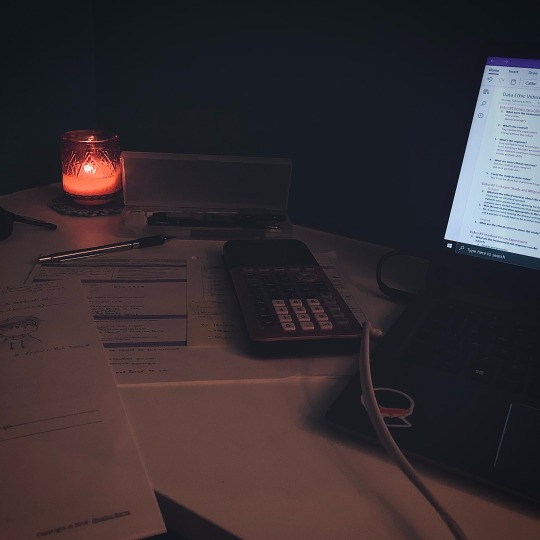
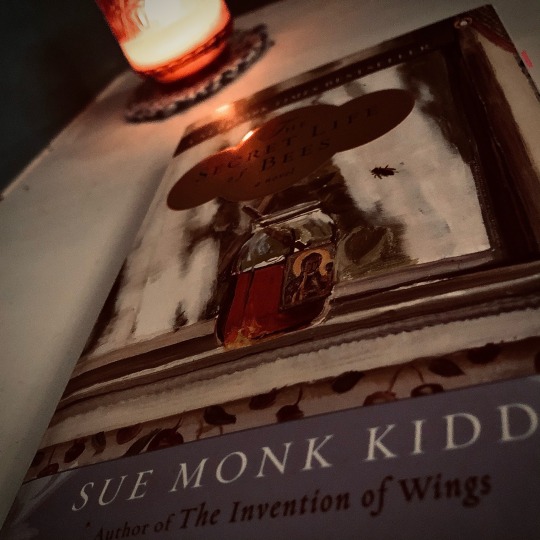
February 22, 2021 // 2nd semester
1/100 Days of Productivity
Book - “The Secret Life of Bees” by Sue Monk Kidd
I created this account in the hopes that it would keep me on task. Boy, was I wrong. I discarded it like any other procrastinator discarded any deadline or assignment.
I've seen this challenge around, and this will be my pitiful first attempt at trying it out.
Today I arrived home, plopped into my seat, and did my daily physic homework. No, it wasn't because my teacher threatened to check the packet ... ok perhaps maybe a little. After that, I went over my stats notes, dolled them up with a heading or two, and turned them in. I reviewed my notes to prepare for an essay in AP Lit tomorrow.
5 notes
·
View notes
Text
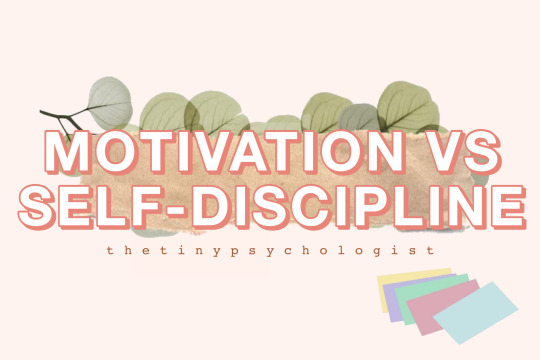
MOTIVATION VS SELF-DISCIPLINE
When studying, most people try to find motivation thinking that this will get them through their study session, or they will see their failure as a result of a lack of motivation. But motivation isn’t always what we need - what do you do on the days you have no motivation? This is why we need self-discipline.
MOTIVATION VS SELF DISCIPLINE
Motivation - a willingness to do something. It is the set of psychological forces that compel you to take action. A goal or reward that you look forward to that will encourage you to study - while this is useful, what happens on a day when you just don’t feel like studying?
Self-Discipline - making yourself do things you know you should do when you don’t want to. Being trained to routinely study regardless of how unmotivated you are - this is what will get you out of bed on a day you don’t feel like studying.
So if motivation is ‘why we should do something’ - self-discipline is more ‘what to do next’.
HOW TO BE SELF-DISCIPLINED
Make a commitment with yourself that you will make studying as your habit. This is super important. Commit yourself to make this as your new habit. Don’t half-ass any of these suggestions or any other suggestions that other people give. Don’t give yourself silly, illegitimate excuses in the process. For this, you can do it by remind yourself on what your long-term goals in life are. Or if they don’t sound rewarding enough, remind yourself what failure feels like/ could feel like.
Set yourself a routine and stick to it
Never have a zero day - try and study every single day - even if you feel absolutely awful - 10 minutes is better than nothing!! Do flashcards from your bed or watch youtube ted talks if you can’t physically study. This will help help develop a routine and make it easier for you to cope. Also, by studying everyday your brain will know that the content you are learning should be stored as long-term information so this will benefit you in the long run!
Avoid long breaks. Unless you know that taking an hour long break means only an hour, then you can ignore this. But fo the majority of us, once we’ve taken a while out of studying it can be hard to get back into it again. One minute you’re taking a 20 minute break for a snack and some phone time and the next thing you know you’re on Youtube and four hours have passed! To avoid this, try stick to shorter breaks - five or ten minutes for a snack break, toilet break and to check any phone messages. A good method to try for this is the Pomodoro Method!
Build on your productivity, not your failures.
If you come from a past of procrastinating and now feel motivated to change and discipline yourself, do NOT try to do everything at once. Start things slow and in steps.
Set yourself smaller deadlines for your goals like monthly and weekly deadlines - e.g. if you are doing a project, due 27th June, set personal deadlines, like have the introduction written by the 8th, have your literature review written by the 15th, have project complete by the 25th.
Break down the things that you must do into smaller, concrete activities and put those smaller activities in that to-do list; allocate specific time periods to do each smaller activities and put it the to-do list as well; set an alarm reminder for each smaller activities. Say you have to study for English on Tuesday, because for whatever reasons you just decided to dedicate your time this Tuesday to study English. However, I’d suggest that you break down that specific activity (or “daily goal”) before putting it in your to-do list. So, instead of just putting “study for Physics”, try putting “read and highlight Chapter 9″, because putting very general/broad activity like “study English” can actually make you too confused on where and how to start doing it, and make you very prone to distractions in the process.
Know your limits. Self-discipline isn’t doing as much as you can until you break - it’s about having control, knowing what you can realistically manage and getting that done.
Give yourself rewards! I love to have something to look forward to as I get work done! This means mixing motivation and self-discipline. I tell myself after this lecture I can have an animal crossing break or check some messages etc.
Track your progress – don’t forget to put a checklist on your to-do list after accomplishing a task. It would relieve your stress a bit and motivate you to continue doing the remaining activities on your to-do list.
Remove distractions from your study space! Personally, if my phone is out and I notice a notification…I’m gonna check it. It’s human nature! So to combat this, I use apps like Forest that force me to stay within the app while I study. If I know I might get hungry during a study session I’ll keep a little snack by my desk so I don’t have to get up and somehow find something else to distract me.
Just do it isn’t that easy. I find to get myself in a ‘work boss’ mood I need to feel good about myself so I put on a nice outfit and maybe some eyeliner and hype myself up so I know I can do my tasks and get stuff done! It feels so much better than lazing in my pyjamas trying to study.
Be patient. It’s going to be a rough journey, it’s going to be hard but you’ve got this! Take it one step at a time. Start off by completing one task a day, then move to two, then three, and the next thing you know, you’ll have a regular routine where you will constantly be ticking off your to-do list everyday! But remember to be kind to yourself, know when your body is not in the right state of health to study and don’t force it. Only force yourself to a limit, you’ll know when to stop and that’s okay. Just try again when you feel better! Your health is much more important!
6K notes
·
View notes
Photo

i received an ask from @sunset-study asking me how to annotate texts so i thought i would do a post giving some of my tips! as an English literature student, i spend a lot of my time doing annotations on loads of different types of texts so i think i have some good advice that i can give. i hope that you will find this helpful and if you have any other questions, please feel free to send me an ask!
disclaimer: these are my personal tips and experiences and i’m sure that there are many more that are relevant. i have tried to do a little bit of research to get some other ideas which hopefully will make this a useful post but as always i appreciate others adding their opinions and advice in the comments!
[Estimated Reading Time: 7 minutes]
What is covered:
General Tips
Things to look for
Specific Tips for Annotating Novels
Specific Tips for Annotating Plays
Specific Tips for Annotating Poetry
Other resources
Keep reading
518 notes
·
View notes
Text
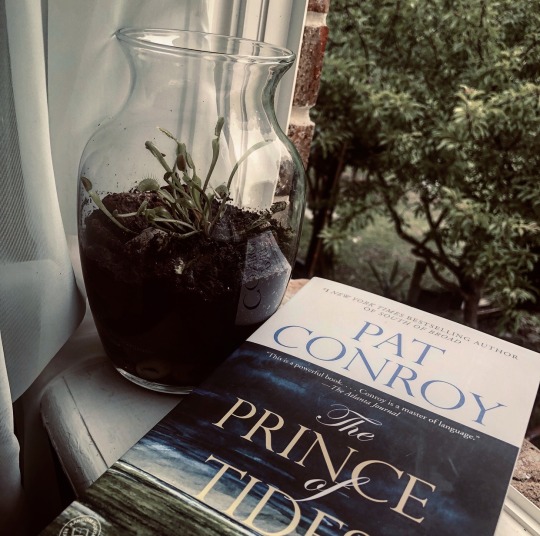
June 9, 2020 // Summer Break
Book- ”The Prince of Tides” by Pat Conroy
Ever since the being of summer break, I've been in a slump. For the past week, I've continuously rotated between the comforts of my bed, the crevices in the living room couch, and the wooden chairs at the dining room table.
Today I've decided to crash out of routine and be productive. Starting with finally planting the Venus Flytrap I rescued from Walmart. I named it Kevin, and it's such an extraordinary plant. Originally It was to be called Diana off of its scientific name Dionaea Muscipula, but Kevin just fit more adequately.
Next, I decided to start on my summer reading assignments. Although I do have roughly two months to work on it, I rather not risk leaving it all to the last week before its due. Procrastination has always been an old friend and enemy of mine. I wouldn't want to give it the upper hand.
2 notes
·
View notes
Text
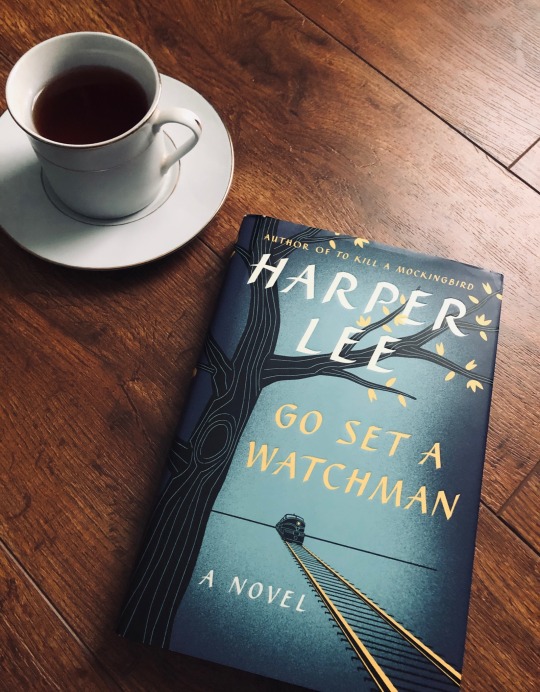
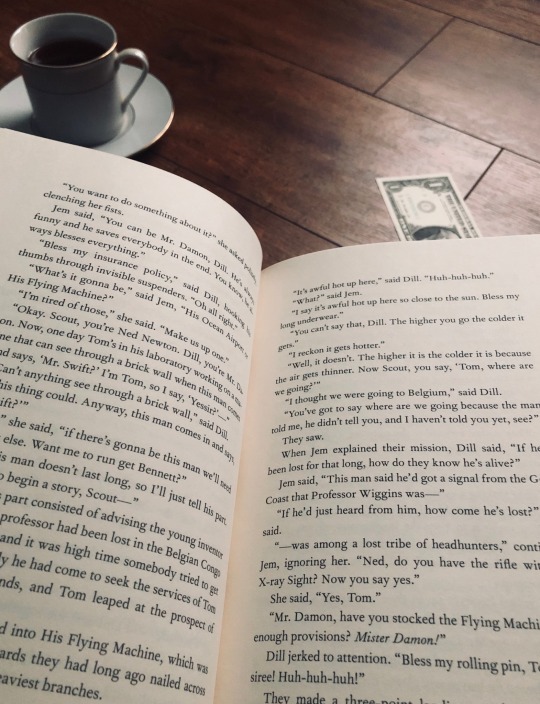
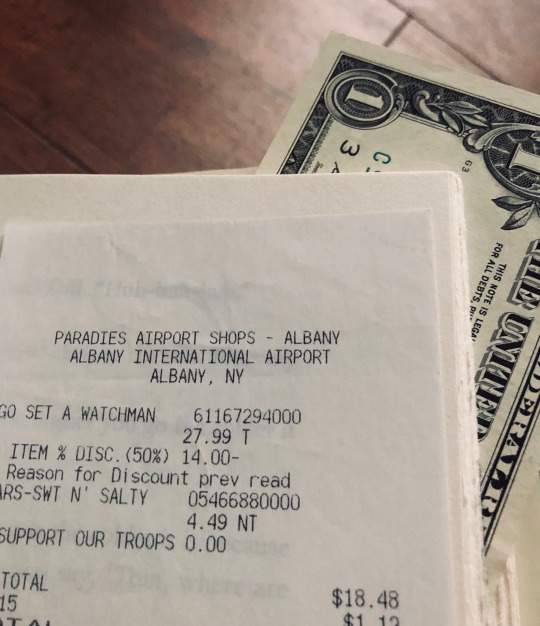
3/31/2020 - # 2020 Quarantine Challenge by @myhoneststudyblr
Week 2 / Pictures
Tue: Take a picture of the book you are currently reading
Quarantine has given me a great excuse to pick up a book and read. Today I have decided to begin reading Go Set a Watchman By Harper Lee. I found this book a few months back while thrifting and had just kinda ignored it until today. While curiously flipping through it, I found an old receipt that says this book was purchased at Albany International Airport in New York. I live in Georgia, So I found this extremely interesting. I also found a dollar, which brought a small drop of joy in my gloomy rainy day.
5 notes
·
View notes
Photo

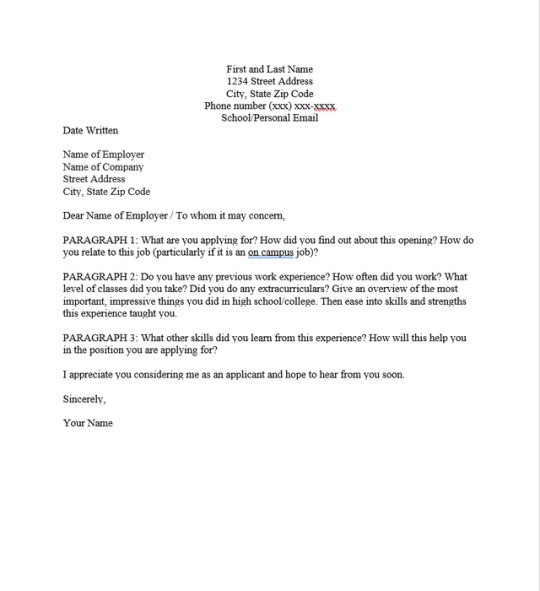
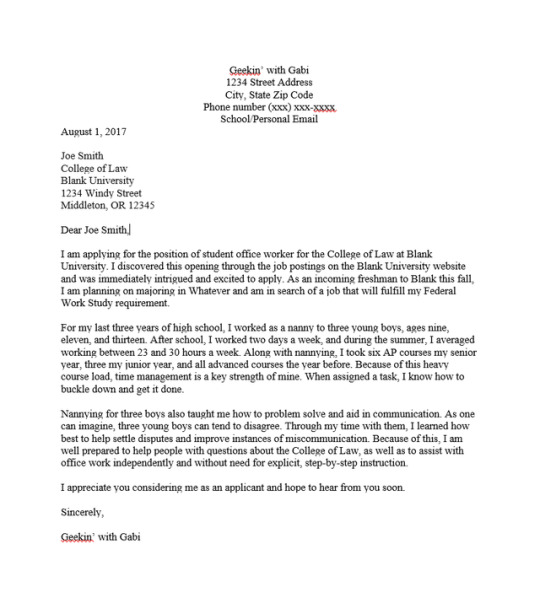
HOW TO WRITE A COVER LETTER
In these two pictures, I show you how to format a cover letter, what questions you need to answer, and an example of a cover letter that got me hired to an on-campus job right off the bat before I even interviewed for the job.
If you follow these tips, you will be way ahead of your competition!
Keep reading
1K notes
·
View notes
Note
So I'm trying to get my first job, and beyond having a stellar resume and cover letter, what can I do to up my chances of getting a follow up interview?
Great question! Here’s some general advice… if you have any specific questions please let me know and I’ll address them!
Resume + Cover Letter
1. Creating a resume. The first step to setting out on a job search is creating the perfect resume! Try to limit your resume to one page that is packed with well worded information about all you have to offer. You may want to create several different resumes that highlight your different skills. For example, I have an IT resume, a teaching resume, and a general resume. Here is a pretty thorough article on creating a resume.
2. Buff up your resume. Now that you’ve created your resume, go over it and exaggerate the fuck out of everything. Nobody is going to stick their neck out for you or going to talk you up. You need to be your own cheerleader. You need to create the most impressive version of yourself on paper as possible. Check it.
3. Keep it clean. First impressions matter! Your resume is going to be your potential employer’s first impression of you. You want that impression to be of someone who is organized, intelligent, and talented. Don’t clutter your resume or make it overly complicated.
4. Cover letter. Not all entry level jobs will require or even ask for a cover letter, but it’s good to have one prepared on the off chance that they do. Think of your cover letter as a teaser to your resume. You don’t want to reiterate it word for word, but you want to spark your potential employer’s interest. Check out this post on constructing the perfect cover letter. Remember- keep it brief, intelligent, and tantalizing.
The Interview
1. Work on your interviewing skills. Your resume will get you through the door, but your personality is what will eventually win you a job. Extroverts have an easier time turning on the charm, but introverts may have to work harder to gain the same ease of conversation. I would recommend seeing some amateur theater or live music performances in your community. Go to a high school musical, see the college Drama Club’s new play. You want the chance to see different levels of confidence in people. Just by watching the performers you’ll be able to easily see who is comfortable being the center of attention and who is not. Let the mistakes or triumphs you see on stage influence the movements, eye contact, and tone of voice that you will use when addressing potential employers. Also, if you don’t want to actually go out, there are loads of community theater youtube videos.
2. Practice makes perfect. Come up with a list of questions that an employer might ask you, and ready your answers confidently. Have a friend “interview” you and have them rate you based on how you respond. If your friend is too positive about your performance, get another one to interview you. You want honesty, you want critiques! If you have no friends or relatives who are able to help you, record yourself answering questions using a webcam. Luckily, there are lots of posts about job interviews on the internet. This is a good one.
3. Talk yourself up. In the interview, you never want to even imply that there is an aspect of the job that you can’t handle. You don’t want to outright lie, but exaggerate your skill levels knowing that once you get in the door, you’ll be competent enough. Never say “I don’t know that skill” say ��I’ve heard a lot about that skill, and I’m interested to learn more”.
4. Ask questions. After the interviewer has asked you all their questions about the prospective job, make sure to ask them several questions in return. The more, the better. Really, truly, honestly. Ask them so many goddamn questions that they feel like they’re being interviewed! These questions should be as specific as possible and should show your interest in the company. Tie in any tidbits of information that you picked up on during your interview, and reiterate important points. Remember, people love talking about their jobs. Use this to your advantage. Get your interviewer talking about the different aspects of what they like and dislike.
5. Follow up. Send a “thank you” email to your prospective employer directly after meeting them. Thank them for taking the time to meet with you, and let them know that you look forward to hearing from them soon. This will show that you have initiative and follow through. Employers love that shit.
Feel free to message me directly about any of this information! I literally got an incredible job by beefing up my resume and talking myself up.
Additional Resources
General Job Advice
How to Include Dungeons & Dragons on Your Resume
How to Write A Cover Letter
How to Write A Cover Letter 2
How to Write A Resume (Like A Boss)
Job Hunting Support
Professional Email Address (For Resumes)
Resume Tips
Strong Words to Use on A Resume
Talk Yourself Up!
Tips for Teenagers
1K notes
·
View notes
Text
Boys as Elective Subjects
Math 1: Professional procrastinator, messy hair and dimples, cycle the only five shirts he has, Lo-fi music, gets spacey occasionally, messy handwritings, gaming all night.
Chemistry: Attentive, detail-oriented, poker face 24/7, study-groups and piled up worksheets, beaming with curiosity, neat hair and clothes, earbuds in, always walking quickly in the streets.
ED Design: Digital arts, laid-back, has the brightest smile you’ll ever see, floral button-downs and shorts, tattooed arm, party nights, McDonalds at 2 AM, gets defensive over things he is passionate about.
Economics: Has casual but trendy style, studies one night before a test, fancy pens, has a lot of friends, gets sleepy easily, towering city lights, smooth talker, impeccable taste in everything.
Accounting: Jazz music, leather-bound planner, cloudy skies, analog watch, three cups of coffee every morning, has the dreamiest tired face, plans everything beforehand.
Math 2: Practical fashion, black and white aesthetic, scattered graphs, uneaten energy bars, smart demeanour, pencil behind ear, modern architectures, soft and clear skin.
Psychology: sensitive, likes deep talks, asking questions during lectures, cut-out quotes, big bookstores, a major dog-person, admirable ambitions, low key worries about his friends.
Physics: minimalistic folders, sport events, stubborn at times, doing homework during period breaks, long drive, action movies, hates essays, rock music, smells like rain.
Media and Communication: old movies, loves to cuddle, charismatic, freshly made doughnuts, festival popcorns, fake optics, patterned socks, doodles on notes, flannel shirts.
Biology: warm-colored hoodies, freckles, morning person, fresh flowers, lying on the park for hours, room filled with plants, nostalgic, takes great care of people, heavy mood swings.
2K notes
·
View notes